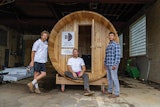In my last two articles, I pointed out that buying a pool is a big deal and until you demonstrate otherwise, you look like everyone else. These are nice concepts, but there aren't many actionable items you can take from them, other than my admonition to get rid of your platitudes and start offering some differentiating facts instead.
Today’s secret, on the other hand, has lots of actionable items and plenty of opportunities for you to make some real changes and improvements in your marketing. To fully appreciate the significance of today's secret, let me restate the key points of the previous two:
- To the average homeowner, buying a pool is a very big deal. It’s large, it's rare, it's unique, and it's very hard to undo if you get it wrong.
- It’s very difficult for the average homeowner to recognize and appreciate the differences between one pool builder and the next. To the average homeowner, you all look the same.
Therefore, we should easily recognize and appreciate the fact that:
- People will spend a long time thinking about the decision to buy a pool. Homeowners don’t typically wake up one morning and say, “Hey, I’ve got an idea – let’s get an in-ground swimming pool!” and then fork over a sizable down payment to a pool builder that same day. Most homeowners will spend months, if not years, mulling over this decision before even making the decision to pick up the phone and call a builder for an interview.
- Homeowners are going to do a fair amount of “research” before they call you so they don’t feel like a helpless and vulnerable idiot in front of an expert pool builder/salesperson.
And where do you suppose the typical homeowner goes to conduct their research? Overwhelmingly, more than 90 percent of all pool-shopping homeowners will do some combination of the following:
- Talk to their friends. (Particularly those who recently purchased a swimming pool.)
- Go to the Internet. (Particularly Google and Yelp.)
So let’s recap what we know about your typical prospective pool buyer. They are most likely:
- Nervous.
- Distrustful.
- Somewhat clueless.
- Hungry for information.
- Visiting the websites of you and your competitors.
- Looking to see what other people say about you – online and off.
- Committed to spending a long time searching for answers.
So yes, I think it’s safe for me to confidently and emphatically say this: Your online image is more important than you think.
I'll start this discussion with a question: What’s the epitome of your online image? That would be your website, of course. (There are other places where your online image will come into play, including Yelp, the BBB, online directories and any number of social media sites. And they can all have some impact on your image, so we’ll eventually talk about those as well. But for now, let’s focus on the one online entity that’s more important than all the others put together: your website.
I’ve written and talked about the importance and significance of pool industry websites in MANY different ways, including here (some website fundamentals), here (more advanced website fundamentals) and here (the importance of mobile-readiness), but for this discussion, I'll lay it all out there as clearly as possible by sharing the most common questions I get about websites:
What’s the primary purpose of the home page? To quickly get people to the right page that contains the answers they’re actually looking for.
How much time should people spend on the home page?As little as possible.
How much time should people spend on the rest of your website? As much as possible.
What’s the most popular page on any pool builder’s website? The photo gallery page. Always the photo gallery page.
How many photographs should I put on my website? How many good photographs do you have? That's how many you should have on your website.
How big should the photographs be? Huge. As big as humanly possible. More accurately, your photos should fill your visitor's screen or monitor. (This is actually easily handled with what is known as responsive image technology. It’s similar to the mobile-friendly responsive website design, but designed specifically for photographs.)
What’s the most powerful thing you can put on my “about us” page? A photograph of you, the owner.
What else that should be on the “about us” page? Lots of interesting and compelling facts and information about you, your company, your history, your talents and specialties, your accreditations, awards, etc.
How important are things like font choices, colors, and the overall layout and design? How important is it that your website visitors choose you instead of your competition?
Is it important that my website be mobile-ready?Only if you want people with mobile phones to buy your swimming pools.
All of our business comes from referrals. Our website has never been a big source of leads for us. So this really doesn’t apply to me, right? Did you ever consider the possibility that the reason all your business is “referrals” is because the "non-referrals" who might discover you through your website are not impressed, and thus decide not to call you at all?
Did you ever consider the possibility that many of your referrals will also go to your website, looking for some confirmation that you are indeed everything someone said you were? And if they aren't impressed with what they see, some of your potential referrals may decide not to call you after all.
And if you only want referrals, have you ever considered using your website as a sales tool, to help explain to your referrals exactly what you do and why you get so many referrals? (A lot of high-end, low volume, under-the-radar pool builders do this all the time. It saves them time, and helps weed out the tire kickers who really can't afford them any way.)
Why, Brett, are you making such a big deal about websites? Because the structure and professionalism of your website is going to have a direct and significant impact on your ability to sell more swimming pools.
That's a lot of information, but let me deliver the main point as bluntly as possible: If your website sucks, then most homeowners are going to presume that you suck.
Sorry, I know it’s not fair, and I know that the website visitors are doing themselves a horrible disservice when they try to judge a pool builder by the beauty and content of their websites. But that, my friend, is the reality of the situation. Remember: Most homeowners don’t know anything about pool construction. All they know and understand is what they can see in your photos. If the pictures are pretty, then they will presume that you build pretty pools. And after all, when you get right down to it, isn’t that pretty much what most homeowners are looking for in the first place? A “pretty pool?”
The bottom line: If you want to sell more pools and/or make more money on the number of pools you are currently selling, then you will need to step it up with your website.
In my next article, I’ll share with you some secrets of how to use all those other online locations where your company image and reputation are at risk, including social media and more.
PS: If you're not sure if your website needs help or not, send an e-mail to [email protected] and say that you want a copy of my “free website evaluation tool.” It’s a simple, easy-to-use Excel spreadsheet that will make you the equivalent of a website expert in less than five minutes.
PPS: If you're more of a "delegator," then send an e-mail to [email protected], and request a free one-on-one website evaluation with me. It will take about 20 minutes or so, and require that you be in front of a computer. (I will do this at no charge for as long as my schedule allows. But they must be scheduled in advance, so please identify a time window that will work for you, and I will do my best to accommodate.)












































